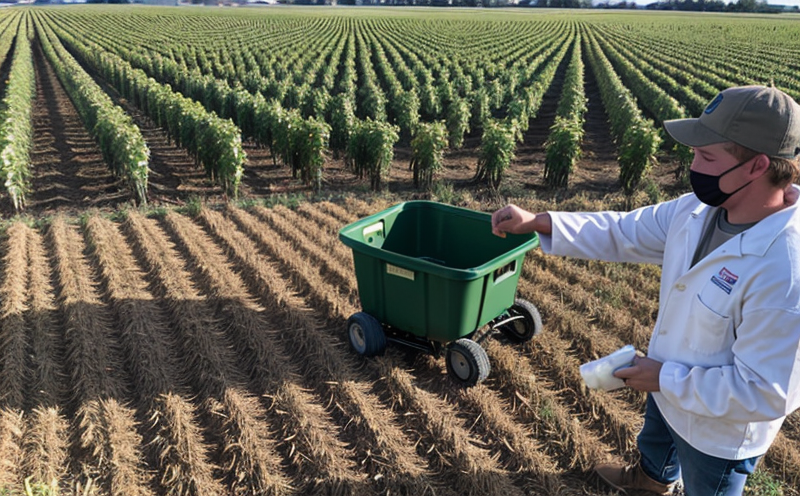Freezing Damage Testing in Stored Produce
The agricultural and forestry sectors face numerous challenges when it comes to post-harvest quality testing. Freezing damage, specifically, poses a significant threat to the integrity of stored produce, leading to potential losses in economic value and sustainability impacts. This service focuses on providing precise freezing damage testing for various types of stored fruits, vegetables, nuts, and grains.
Freezing is often employed as a preservation method; however, it can also lead to damaging effects such as ice-crystal formation within the produce cells. Ice crystals can disrupt cellular structures, causing tissue breakdown and reducing shelf life. This service utilizes advanced cryoscopic techniques to evaluate the extent of freezing damage, ensuring that stored produce maintains its optimal quality.
Our testing methodologies comply with international standards such as ISO 16472:2015 for frozen fruits and vegetables. We employ a range of sophisticated equipment including differential scanning calorimeters (DSC) and cryomicroscopes to analyze the physical properties of the produce before, during, and after freezing.
Preparation steps are critical in this process. Fresh samples must be collected from storage units at specific intervals and transported under controlled temperature conditions to our laboratory for testing. Specimens undergo rigorous preparation: they are cleaned, weighed, and sliced into uniform pieces suitable for analysis. Once prepared, the samples are subjected to freezing conditions that mimic real-world scenarios.
The results of these tests provide critical data on the extent of damage due to freezing, enabling stakeholders in agriculture and forestry sectors to optimize storage processes. These insights contribute significantly towards maintaining quality standards and enhancing marketability of produce.
- Understanding how different varieties respond under various temperature conditions allows for better preservation strategies.
- Detailed knowledge helps minimize waste by adjusting storage practices accordingly.
In summary, our freezing damage testing service ensures that stored produce remains safe and high-quality throughout its lifecycle. By leveraging advanced scientific methods, we offer reliable assessment which is vital for maintaining the integrity of agricultural products post-harvest.
Customer Impact and Satisfaction
The success of any testing service hinges on its ability to meet customer expectations. In our case, this translates into delivering accurate results that inform effective decision-making processes within the agricultural industry. Here’s how we ensure satisfaction:
- Precision & Reliability: Our tests are conducted using state-of-the-art equipment and methodologies that adhere strictly to international standards like ISO 16472:2015.
- Quick Turnaround Times: We understand the importance of timely results, so our processes are designed to minimize delays without compromising accuracy.
- Comprehensive Reporting: Detailed reports not only provide numerical data but also interpret findings in a way that is actionable for decision-makers.
We pride ourselves on providing services that exceed expectations. Our clients have reported improved product quality and reduced waste through better understanding of freezing effects on stored produce. This leads to enhanced profitability and sustainability within the industry.
Environmental and Sustainability Contributions
In today’s world, sustainability is more than just a buzzword—it's an imperative for all sectors, including agriculture. By offering freezing damage testing services, we contribute positively to environmental goals by helping reduce food waste. Here are some ways:
- Optimized Storage Practices: Understanding how different types of produce react under varying temperatures allows farmers and distributors to store products more effectively, minimizing spoilage.
- Energy Efficiency: With precise knowledge about optimal storage conditions, facilities can operate their cooling systems more efficiently, thereby reducing energy consumption and carbon emissions.
Beyond these practical benefits, our service plays a role in fostering innovation within the agricultural sector. By identifying areas where improvements are needed, we encourage further research into better preservation techniques, contributing to long-term environmental stewardship.
Competitive Advantage and Market Impact
In an increasingly competitive market, maintaining quality while minimizing costs is crucial for agricultural businesses. Our freezing damage testing service provides a competitive edge by:
- Data-Driven Decisions: Armed with precise data about the effects of freezing on their products, companies can make informed decisions that enhance product quality and shelf life.
- Better Marketing Strategies: Understanding the nuances of how different storage methods affect produce helps marketers position products more accurately, appealing to discerning consumers who value freshness and sustainability.
This knowledge also allows companies to comply with increasingly stringent regulatory requirements related to food safety and quality. Consequently, they can enter new markets more confidently, knowing their products meet global standards for both taste and integrity.





